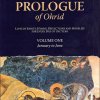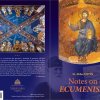St Nikolai of Zica (Velimirovic) (1880-1956) has been called the "Serbian Chrysostom" for his theological depth and golden-tongued eloquence. Now for the first time, a complete and unabridged English translation of St. Nikolai's Prologue of Ohrid has been made available. St. Nikolai's Prologue has become a much-loved spiritual classic for Orthodox Christians worldwide. An inspirational source-book of the Orthodox Faith, it contains within its pages a summation of the Church's wisdom and Her experience of sanctity through the Grace of Jesus Christ. Lives of Saints, Hymns, Reflections and Homilies are presented for every day of the year. St. Nikolai's beautiful Hymns have never before appeared in English.
The text of this 1,450-page magnum opus of St. Nikolai has been translated from the Serbian and edited by clergy and monastics of the Serbian Orthodox Diocese of Western America.
In two volumes, hardbound, with full-color dust jackets.
New 2nd Edition 2008
Volume I: January to June, 650 pages (ISBN 0-9719505-0-4)
Volume II: July to December, 704 pages (ISBN 0-9719505-1-2)





